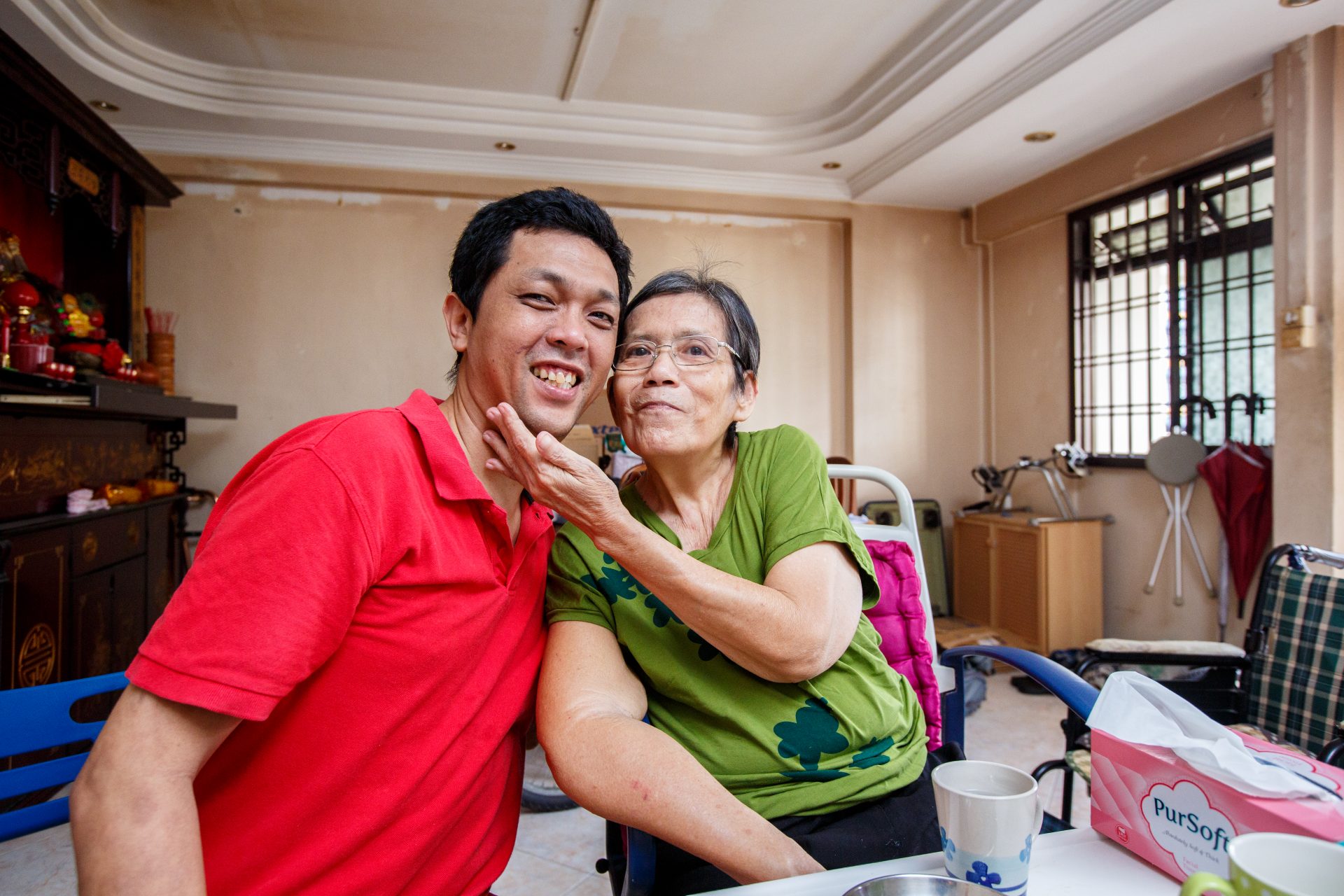For years, Mr Chua Joo Ee has been caring full-time for his mother, who is diagnosed with dementia. We follow his caregiving story and look at how he became an active volunteer with Alzheimer’s Disease Association’s (ADA) Caregiver Support Service.
Elderly patients diagnosed with dementia are often cared for by their children or spouse as they may experience difficulties in performing simple tasks daily. In looking after their ailing loved ones, caregiving family members often encounter frustration and exhaustion in their daily lives. But many of them emerge stronger and become more positive in the face of adversity.
43-year-old Mr Chua Joo Ee shares such a story. His journey as a caregiver began when his mother, Mdm Toh Wee, was diagnosed with dementia five years ago. The alarm bells first rang when her emotional health underwent radical changes. After being discharged from Singapore General Hospital (SGH) for joint problems in 2011, Mdm Toh started to exhibit abnormal behaviour at home. Tantrums and outbursts became a new norm in the house, and she sometimes became physically aggressive. This left Joo Ee and his family confused and worried.
She was admitted back to the A&E department at SGH soon after and was warded in the hospital for another 12 days. Becoming excessively suspicious of the people around her, Mdm Toh refused to eat unless Joo Ee was there to cajole her. She was then referred to a psychiatrist, who diagnosed her with vascular dementia.
Facing Dementia
“I didn’t know anything about dementia then,” Joo Ee recounts. Upon further inquiry from the psychiatrist, it was discovered that Mdm Toh’s late father—Joo Ee’s maternal grandfather—was once afflicted with the disease, indicating that Mdm Toh’s condition was likely hereditary.
Despite the shock from the news, Joo Ee did not lose hope. He was tenacious and resolved to confront the problem bravely. “I must find out more about the problem,” he told himself. He took it upon himself to actively research on how to care for his mother.
The days ahead were rough. Medication did not provide an instant cure: it took two to three months of adjustment, coupled with dosage modifications, before Mdm Toh’s condition gradually stabilised. From 2012 to 2014, Mdm Toh was in the care of New Horizon Centre (Jurong Point), which is managed and supported by ADA. Following a serious stroke in 2014, she resided in a nursing home’ home for about two to three months, before Joo Ee took her home to care for her full-time.
Finding a second family
Initially, Joo Ee felt overwhelmed by his newfound responsibilities as his mother’s primary caregiver. He currently also looks after his father, who has kidney failure.
But Joo Ee did not remain alone in his journey. Mdm Toh’s psychiatrist at SGH introduced him to ADA. Joo Ee was invited to his first session with ADA’s Caregiver’s Support Group. It was there where he met many fellow caregivers, who shared similar struggles with him.
At the meetings, caregivers got to meet social workers and healthcare professionals, who were ever-ready to offer advice on mitigating issues they faced at home. Volunteer doctors from Tan Tock Seng Hospital also came by occasionally to give talks, providing caregivers with valuable information on dementia. The participants enjoyed stress-relieving activities such as yoga and tai-chi.
During these sessions, caregivers would leave their loved ones in the care of volunteers at the Caregiver Support Centre, who’d entertained them with arts and craft, drawing, songs and other activities.
Joo Ee feels extremely heartened that he has found a group of people whom he can call his second family. The support group meetings served as a respite from his daily duties of caring for his mother. “Not everyone can understand,” he explains. “Sometimes when we feel very frustrated or if we have problems we cannot solve, the group serves as a place we can confide in.”
From caregiver to facilitator
Having benefitted from the Caregiver Support Service programme, Joo Ee decided to contribute back. In 2014, he underwent a two-day training course and became a support group facilitator. He now counsels and supports newcomers, together with several of his peers who also returned as volunteers.
As a caregiver who has once been at wit’s end, Joo Ee knows how stressful it can be for caregivers to keep their problems to themselves. His goal as a facilitator is to encourage them to air their thoughts in a safe environment, and for them to find support with people going through the same challenges as they are.
Joo Ee’s positive attitude and immense fortitude have made him one of the three recipients of the Singapore Patient Action Awards at this year’s Singapore Patient Conference, organised by Tan Tock Seng Hospital on 28 October. The award honours individuals who play an active role in the recovery of their family members.
Despite being delighted in gaining recognition for his efforts, Joo Ee remains deeply grounded and humble, focusing only on caring for Mdm Toh. “Life is very short,” he explains. “I want to take care of her while I still can.”



